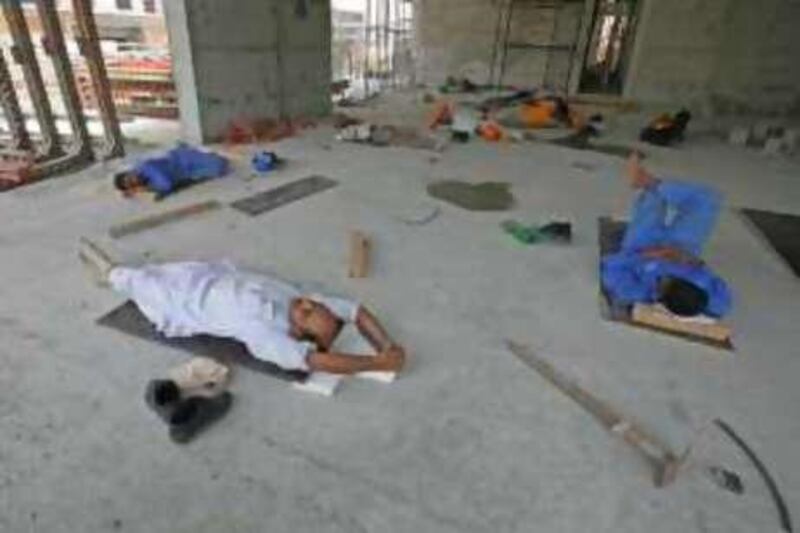As clocks struck 12.30pm yesterday, labourers downed tools on the first day of the summer midday break, but many struggled to find shelter from the sun. In the heat of the day, the men said they were grateful for the enforced break, but called on their companies to follow the rule to the letter of the law and provide much-needed shade. As temperatures reached 40C in Abu Dhabi and Sharjah, and 38C in Dubai, reporters from The National visited sites across the UAE to see if employers and workers were abiding by the law, which the Ministry of Labour has said will be strictly enforced.
The midday break rule was introduced in 2005 to ensure the health and safety of workers by imposing a ban on work at construction sites between 12.30pm and 3pm from July 1 to August 31. Added measures introduced by the ministry last month said workers had to be provided with covered rest areas and air conditioning during the break. However, not all companies have been able to provide shelters. Many workers in Sharjah could not find decent enclosures, so they rested under trees while others remained at their sites. In Dubai, workers were found sitting on roads, parks and under bridges.
"It is mandatory to give the midday break and provide shelter to the workers. However, many times there is no place in the site for such shelter areas. Most companies are trying to solve this issue they are facing," said a contractor at a construction site in Al Barsha in Dubai. In Sharjah, Vishal Kumar, a construction site worker, sat with colleagues under trees opposite their building site. He said several colleagues were inside the site but there were no air conditioners. "Our boss doesn't want us to go to our accommodation because we shall be late back to work," he said.
Mr Kumar's colleagues said their companies should allow them to return to their quarters to rest. "The engineers for themselves go to their homes but why are we not allowed also to go to our room?" a worker asked. At a construction site near Al Wahda mall in Abu Dhabi, air-conditioned tents had been set up to accommodate the men, although in one tent the equipment was not working. "See how hot it is outside? We are saved by the tents," said Mohammed Rahim, a mobile crane operator. "We will be able to work better after the break. I don't know about other companies but this much we know, that we have to rest during the afternoon."
Workers at a construction site on Hamdan Street in Abu Dhabi sought respite from the heat at a nearby grocery store, where they bought drinks before retreating to their rest area. Jahan Zaeeb, a construction worker, planned to say his prayers before taking a nap, but said there were no allocated resting areas at the site. Instead, the men were resting in partly demolished buildings. The relentless construction activity in Dubai came to a virtual standstill for exactly two-and-a-half hours as labourers sat down in every available bit of shade to enjoy the break.
Karim Lal, a worker in Al Barsha area, used the break to have lunch and take a nap in a shaded spot on the site. "The company said that an air-conditioned shelter would be ready soon," said Mr Lal. "This break is a great relief as we get exhausted easily due to the heat." However, there were a few apparent violations in Sharjah and Dubai. At a site near Taawon mall in Sharjah, labourers were still working at about 1pm.
"We are sorry, having been delayed a few minutes but we have finished, we are going," said the chief foreman of the company. Work at a site in the Dubai Marina area also continued during the break. An engineer insisted that most of his workers were on a break and that the ones still working were doing so in a shaded area. "We were told by the authorities that the workers should not be made to work under the sun during these hours and we are abiding by this," he said.
Rashid al Khayal, the head of Sharjah's labour department, said inspections had started in Sharjah but details regarding violations would be handed to the Ministry of Labour in Abu Dhabi. Starting yesterday, six inspectors in Ras al Khaimah are on the lookout for violators. Companies such as Aldar Properties, whose projects in Abu Dhabi include Yas Island and Al Raha Beach, said there were no disruptions to its construction timetable as working hours had been adjusted to comply with the regulations.
"The midday summer break has been in place ever since Aldar started building projects so the company and its workers are well aware of the working policy during the summer months and the precautions they need to take to maintain good health," said Ousama Ghannoum, the marketing and media director. However, Mr Ghannoum said feedback from the workers showed they preferred normal working hours, which let them finish work earlier so they could relax and socialise.
The Ministry of Labour has announced that companies violating the rule for the first time would be fined Dh10,000 and all their transactions would be suspended for three months. They would be listed in category C on a ministry schedule, which ranks companies A, B, or C based on performance in several areas. Second-time violators would face suspension of work licences for at least six months and a fine of Dh20,000 (US$5,445). Third-time violators could have their licence suspended for one year and be fined Dh30,000.
According to inspection department statistics, 617 companies were found violating the work ban in 2007. Site visits by labour inspectors increased from 3,699 in 2006 to 7,070 in 2007, officials said.
* Reporting by Suryatapa Bhattacharya and Robert Ditcham in Abu Dhabi, Praveen Menon in Dubai, and Yasin Kakande in Sharjah






